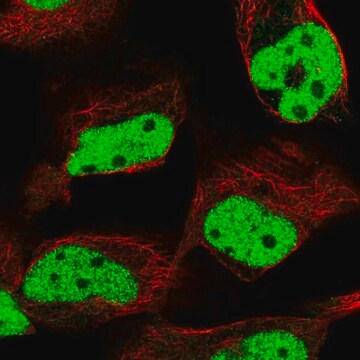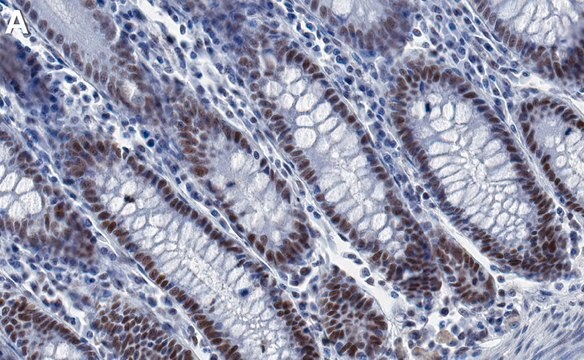M8320
Anti-MLH1 (N-terminal) antibody produced in rabbit
~1 mg/mL, affinity isolated antibody, buffered aqueous solution
Sinónimos:
Anti-COCA2, Anti-FCC2, Anti-HNPCC, Anti-MGC5172
About This Item
Productos recomendados
biological source
rabbit
conjugate
unconjugated
antibody form
affinity isolated antibody
antibody product type
primary antibodies
clone
polyclonal
form
buffered aqueous solution
mol wt
antigen 80-85 kDa
species reactivity
rat, human, mouse
packaging
antibody small pack of 25 μL
concentration
~1 mg/mL
technique(s)
immunocytochemistry: 2.5-5 μg/mL using MCF7 cells fixed with paraformaldehyde-Triton
immunoprecipitation (IP): 5-10 μg using Jurkat cell lysates
western blot: 0.5-1 μg/mL using Jurkat cell lysates
UniProt accession no.
shipped in
dry ice
storage temp.
−20°C
target post-translational modification
unmodified
Gene Information
human ... MLH1(4292)
mouse ... Mlh1(17350)
rat ... Mlh1(81685)
General description
Immunogen
Application
- Anti-MLH1 (N-terminal) antibody produced in rabbit has been used in:
- immunoblotting
- immunoprecipitation
- immunocytochemistry
Biochem/physiol Actions
Target description
Physical form
Disclaimer
¿No encuentra el producto adecuado?
Pruebe nuestro Herramienta de selección de productos.
Related product
Storage Class
10 - Combustible liquids
wgk_germany
WGK 3
flash_point_f
Not applicable
flash_point_c
Not applicable
ppe
Eyeshields, Gloves, multi-purpose combination respirator cartridge (US)
Certificados de análisis (COA)
Busque Certificados de análisis (COA) introduciendo el número de lote del producto. Los números de lote se encuentran en la etiqueta del producto después de las palabras «Lot» o «Batch»
¿Ya tiene este producto?
Encuentre la documentación para los productos que ha comprado recientemente en la Biblioteca de documentos.
Nuestro equipo de científicos tiene experiencia en todas las áreas de investigación: Ciencias de la vida, Ciencia de los materiales, Síntesis química, Cromatografía, Analítica y muchas otras.
Póngase en contacto con el Servicio técnico







